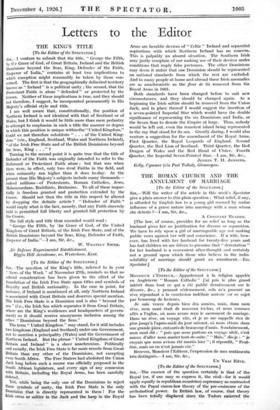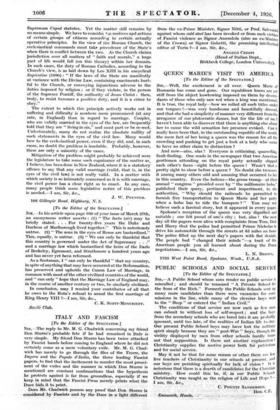Sin, — The essence of the question certainly is that of the
Royal (or, if one may so express it, the civil—for it would apply equally in republican countries) supremacy as contrasted with the Papal canon-law theory of the pre-eminence of the ecclesiastical power. In British law, of course, that theory has been totally displaced since the Tudors enforced the Supranum Caput statutes. Yet the matter still remains by no means simple. We have to considet '.}e motives and actions of certain groups of citizens according to certain .-actually operative principles. In the view of the Roman Church, the _ecclesiastical commands must take precedence of the State's when there is conflict between the two As the Church claims jurisdiction over all matters at " faith and morals," a huge part of life would fall (on this theory) within her domain. In such cases, the duty of Roman Catholics, according to the Church's view, is as laid down by Leo XIII in his encyclical Sapientiae (1890) : " If the laws of the State are manifestly at variance with the Divine LaW, containing enactments hurt- ful to the Church, or conveying injunctions adverse to the duties imposed by religion ; or if they violate, in the person of the Supreme Pontiff, the authority of Jesus Christ : then, truly, to resist becomes a positive duty, and it is a crime to 9bey.ss
The extent to which this principle actively works out in suffering and difficulty is nowhere more pronounced (at any rate, in England) than in regard to marriage. Couples, who are validly married in the eyes of the law, arc frequently told that they are " living in sin," and must part or be re-wed.
Unfortunately, many do not realize the absolute nullity of such statements in the eyes of the civil law. Many would bow to the ecclesiastical power, even if they did, and, in such cases, no doubt the problem is insoluble. Probably, however, these are only a minority of the cases.
Mitigation of the problem might probably be achieved were
the legislature to take some such cognizance of the matter as, I believe, has been done in New. Zealand, where it is a statutory offence to say that any valid marriage (valid, that is, in the eyes of the civil law) is not really valid. In a matter with which society is so intimately concerned as it is with marriage, the civil .power has a clear right so to enact. In any case, many people think some legislative notice of this problem is needed.—I am, Sir, &c., J. W. POI-N*1'ER.
106 Gillespie Road, Hig hbury, N. 5.































































 Previous page
Previous page